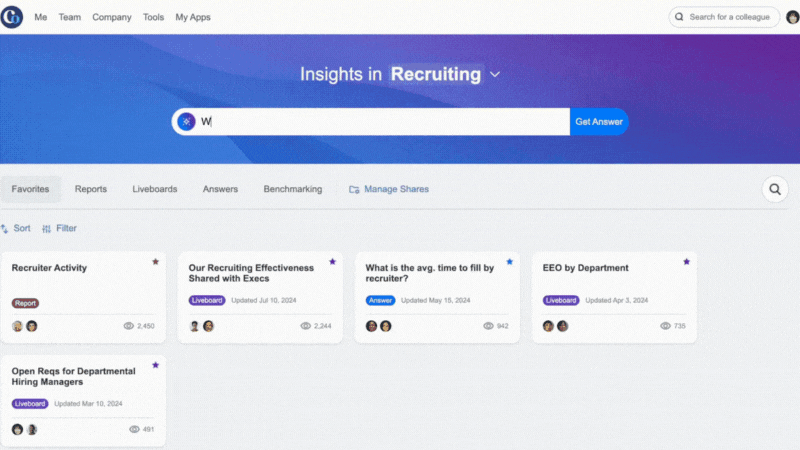How many human resources software tools are your team using to get their work done? If you can’t count them with two hands — even two hands and two feet — you’re not alone. The average HR team is using 21 different “modules” at work, handling everything from payroll and benefits to timesheets, PTO, and compliance training. You use still other systems for talent management tasks like giving performance reviews, sending employee engagement surveys, and recognizing achievements and milestones.
But it doesn’t have to be that way. A unified talent management system (TMS) combines, supports, and simplifies these processes to help your HR team create an incredible employee experience.
Keep reading to learn more about total talent management solutions.
What Is a Talent Management System?
Rather than piecemeal systems handling different tasks, a talent management system supports your people throughout the employee lifecycle — from their first day to their last. The software supports your talent management strategies and processes with faster workflows and talent analytics bolstered by more complete, accurate data. Your team wastes less time and gets access to better insights, which you can act on to improve the employee experience.
Talent management systems have many benefits for employees, people management teams, and businesses alike:
- Increase employee engagement and motivation for higher productivity
- Show employees your company is invested in their growth and success
- Close skills gaps in your workforce and promote internal mobility
- Boost employee retention, cutting down on hiring costs
- Enable data-driven decisions through advanced talent analytics and insights
- Streamline compliance processes and simplify regulatory reporting
- Foster open communication and collaboration throughout your organization
- Advance diversity, equity, and inclusion efforts at every stage of the employee lifecycle
Reap all these benefits by implementing strong talent management strategies and supporting them with the right software solution.
The Benefits of Talent Management Systems
A unified talent management platform is one of the most important tools in an HR leader’s toolkit because it connects every part of the employee lifecycle. It’s the central hub for managing, monitoring, analyzing, and improving talent processes, from recruiting and compensation management to employee development and succession planning.
A strong talent management system helps you attract, engage, and retain top talent by enabling your HR team to create engaging experiences for both candidates and employees. By supporting every stage of the talent journey, you build a motivated, high-performing workforce that is committed to your organization.
With a centralized TMS, all talent-related activities are in one place, and every team has access to the same up-to-date information. That empowers HR, hiring managers, and leaders to work more efficiently and make better decisions.
- For HR teams, a talent management system streamlines workflows by combining applicant tracking, onboarding, engagement surveys, learning paths, performance cycles, and more into one cohesive system. It also gives them access to AI-powered solutions that assist with everything from writing job posts to analyzing performance trends.
- For hiring managers, the system simplifies the evaluation process. They can review candidate profiles and interview guides, take AI-assisted interview notes, access interview feedback, and make data-driven decisions in one place.
- For people leaders and L&D teams, it provides tools to set team goals, offer real-time recognition, conduct meaningful performance reviews, create career paths, and track employee progress. It provides all the capabilities of a complete learning management system (LMS) boosted by connected performance and engagement data. All of that helps create a culture of continuous development.
Features of Top Talent Management Systems
Top talent management systems give you access to features that help you build a workforce of employees who are engaged, productive, and on the path to long-term success. It brings all your HR processes together, creating simpler workflows that are more effective because they’re connected.
Check out the TMS features that matter most:
Applicant Tracking System (ATS): Streamlines Hiring
An ATS saves time for HR and delivers a better experience for candidates, reducing bottlenecks and making it easier to identify top talent. With the right ATS, you can improve hiring efficiency and help ensure a positive impression from the very first interaction.
Other important talent acquisition features include:
- Frictionless background checks
- AI-enabled candidate sourcing
- Interview guides, scorecards, and AI notetaker assistant
- Complete digital onboarding, including an employee portal and e-signature verification
- Compensation management
LMS: Supports Skill Growth and Agility
An LMS helps employees grow their skills and adapt to new challenges. It gives everyone access to training that’s clear, consistent, and tailored to their needs, supporting long-term development and faster skill-building. LMSs make it easy to learn and track progress, which is key for keeping your team prepared and motivated.
Advanced Analytics: Actionable Understanding and Better Strategy
Advanced analytics turn everyday HR data into powerful insights that enable fast, informed decision-making. With the right analytics tools, organizations can spot trends, measure workforce effectiveness, and identify opportunities for improvement. It’s all visible in a single dashboard and enhanced by AI-driven insights.
This level of clarity makes it easy to track HR effectiveness, monitor workforce trends, and forecast business needs.
AI: Work Smarter and Faster
AI-powered solutions handle repetitive tasks and surface data-driven recommendations, so your team can focus on higher-level strategy and people-first work. AI helps improve hiring speed, remove bias, and deliver a more personalized employee experience. Using AI boosts both efficiency and accuracy while creating a more agile HR function.
AI has a huge number of applications in HR, including:
- Automating repetitive tasks like screening resumes, coordinating interviews, and
- Improving candidate sourcing and accelerating outreach
- Building personalized training paths for employees
- Highlighting bottlenecks like long hiring cycles and trends like retention by department
These essential features do more than just take manual work off your team’s hands — they help you hire great employees, enable them to do their best, and then watch them thrive.
Connected Talent Management Starts With ClearCompany
Discover how ClearCompany’s Talent Management System brings all these powerful features together to drive team success and growth. See the difference for yourself — request a demo today and start building your best workforce.


